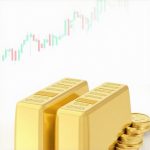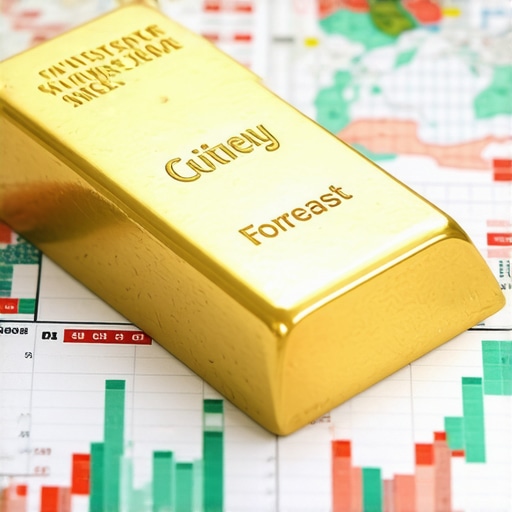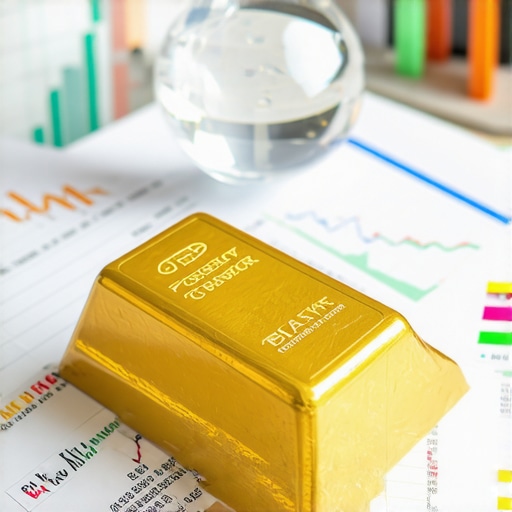Understanding the Dynamics of Gold Prices Amid Economic Changes
Gold has long been viewed as a safe-haven asset, particularly in times of economic uncertainty. Investors often turn to gold when traditional markets become volatile, making it essential to understand how gold prices respond to various economic changes. This article delves into the factors influencing gold prices today and how they fluctuate in reaction to economic trends.
What Factors Influence Gold Prices During Economic Fluctuations?
Several key factors determine the price of gold, especially during economic downturns:
- Inflation Rates: Gold is often seen as a hedge against inflation. When inflation rises, the purchasing power of currency decreases, prompting investors to seek stability in gold. Historical data shows that during periods of significant inflation, such as the 1970s, gold prices surged as investors sought to protect their wealth.
- Interest Rates: The relationship between interest rates and gold prices is inversely correlated. When interest rates are low, the opportunity cost of holding gold decreases, leading to increased demand. Conversely, higher interest rates tend to strengthen the dollar and make gold less attractive.
- Geopolitical Tensions: Unrest and uncertainty in global politics can trigger spikes in gold prices. For instance, during times of war or political instability, gold has historically seen a price increase as investors flock to its perceived safety.
- Central Bank Policies: Central banks play a crucial role in the gold market. Their buying and selling activities can significantly influence gold prices. For example, when central banks increase their gold reserves, it often signals confidence in the asset, leading to price increases.
How Do Economic Changes Impact Gold Demand?
Economic changes lead to fluctuations in demand for gold, which in turn affects its price. For example, in a weak economy, demand for gold jewelry may decline, but investment demand for gold bars and coins may increase as individuals seek a safe haven. According to the World Gold Council, global gold demand has shown resilience, particularly during economic downturns, indicating a shift towards investment rather than consumption.
What Trends Are Emerging in Today’s Gold Market?
As we navigate the complexities of the current economic landscape, several trends are emerging within the gold market:
- Increased Retail Investment: More individuals are investing in gold as they become aware of its benefits as a long-term asset. Online platforms have made purchasing gold more accessible, leading to increased retail demand.
- Sustainable Gold Mining: There is a growing emphasis on ethical sourcing and sustainability in gold mining practices. Consumers are increasingly considering the environmental and social impacts of their investments.
- Technological Advances: Innovations in gold trading and investment, such as gold-backed cryptocurrencies, are gaining traction, attracting a younger generation of investors.
Understanding how gold prices respond to economic changes is crucial for investors looking to navigate the market effectively. By recognizing the key influencing factors and emerging trends, you can make informed decisions about your gold investments. Have you considered how gold can protect your investments during economic downturns? Feel free to share your thoughts in the comments below!
Exploring the Impact of Economic Indicators on Gold Prices
Economic indicators play a significant role in determining the fluctuations of gold prices. Investors closely monitor these indicators to gauge market sentiment and make informed decisions about their investments. Key economic indicators include GDP growth rates, unemployment levels, and consumer confidence indices, all of which can influence the demand for gold.
How Do Economic Indicators Affect Gold Investments?
When the economy is thriving, and consumer confidence is high, the demand for gold may decrease as investors prefer to allocate funds into stocks and other growth assets. Conversely, during economic downturns, such as recessions, gold often becomes a preferred investment. According to Wikipedia, gold has historically maintained its value during inflationary periods, making it a reliable store of wealth.
Another vital aspect is the correlation between gold prices and currency strength, particularly the US dollar. A weakening dollar often results in higher gold prices, as gold becomes cheaper for foreign investors. This inverse relationship emphasizes the importance of monitoring currency fluctuations and their potential impact on gold market dynamics.
Understanding Gold Supply and Demand Dynamics
The interaction between gold supply and demand is crucial in shaping price trends. Global gold production levels, mining output, and recycling rates directly impact gold’s availability in the market. When production declines due to geopolitical issues or environmental regulations, the scarcity can drive prices up.
What Are the Current Trends in Gold Supply?
As sustainability becomes a priority, many mining companies are adopting greener practices. This shift is not only beneficial for the environment but also appeals to socially conscious investors. The rising emphasis on sustainable gold mining can reshape the market landscape, potentially leading to increased demand for ethically sourced gold.
Investor Sentiment and Market Psychology
Investor sentiment significantly influences gold prices. Emotional responses to economic news, geopolitical events, and market trends can create swift price movements. Understanding market psychology is vital for investors looking to capitalize on gold’s volatility. The fear and uncertainty associated with economic downturns often drive investors towards gold as a safe haven.
How Can Investors Prepare for Gold Market Volatility?
Investors can better navigate the gold market by staying informed about global economic developments and preparing for potential price shifts. Diversifying their investment portfolio to include a mix of gold assets, such as coins, bars, and ETFs, can help mitigate risks associated with market fluctuations.
Additionally, following expert analyses and insights into gold price trends can provide valuable guidance. For instance, exploring articles on gold price predictions can equip investors with the knowledge needed to make strategic decisions.
As you consider your investment strategies, think about how you can leverage gold’s unique qualities to safeguard your wealth. What strategies have you found effective in managing your gold investments? Share your thoughts and experiences in the comments below!
Diving Deeper into Gold Market Psychology
The psychological factors that affect investor behavior can significantly influence gold prices. Sentiment can often override fundamental analysis, leading to sudden price movements. For instance, during economic crises, fear often drives investors to gold, perceived as a stable asset amid uncertainty. Understanding these psychological triggers is essential for both seasoned and new investors looking to navigate the gold market effectively.
What Psychological Factors Influence Gold Prices?
Investor sentiment is shaped by various psychological factors, including:
- Fear and Greed: The emotional responses to market conditions often lead to irrational buying or selling. During market downturns, fear can drive up demand for gold, as investors seek security.
- Herd Behavior: When investors see others buying gold, they may feel compelled to follow suit, pushing prices higher based on collective sentiment rather than fundamentals.
- Market News and Speculation: News events can create immediate reactions in the gold market. For example, reports of inflation or geopolitical tensions can trigger buying sprees, leading to short-term price spikes.
According to Investopedia, understanding these psychological factors can help investors make more informed decisions in the gold market.
The Role of Global Events in Shaping Gold Demand
Global events, such as political unrest or natural disasters, can dramatically impact gold demand. Investors often flock to gold during these times, driving prices higher. For example, significant elections, trade conflicts, or health crises can create uncertainty, leading to increased buying pressure on gold.
How Do World Events Influence Investor Decisions on Gold?
World events can create both opportunities and risks in the gold market:
- Political Instability: In times of political unrest, gold typically sees an increase in demand. Investors often view gold as a hedge against potential currency devaluation or economic collapse.
- Global Health Crises: Events like the COVID-19 pandemic have shown how quickly investor sentiment can shift. During such crises, gold often becomes a go-to asset for those seeking to protect their investments.
- International Relations: Trade agreements or conflicts can also affect gold pricing. For instance, tariffs on gold imports or exports can impact its availability and value.
Being aware of these dynamics can help investors anticipate market movements and adjust their strategies accordingly.
Strategies for Investing in Gold Wisely
To successfully invest in gold, consider implementing the following strategies:
- Diversification: Incorporate gold into a broader investment portfolio to mitigate risks. This approach allows you to balance potential losses in other asset classes with gold’s stability.
- Stay Informed: Keep abreast of economic indicators and global events that could impact gold prices. Knowledge is power in the ever-changing landscape of gold investment.
- Long-Term Perspective: While gold can experience short-term volatility, maintaining a long-term investment horizon can yield positive results for dedicated investors.
As you refine your investment strategies, consider how these approaches align with your financial goals. Have you had experiences that shaped your views on gold investments? Share your thoughts in the comments below!
Navigating Global Events and Their Impact on Gold Investment Strategies
As gold continues to be a popular choice for investors seeking stability, understanding how global events shape its market dynamics is crucial. Factors such as political unrest, economic crises, and international relations can significantly influence gold prices and investor sentiment. By recognizing these influences, you can better position your investment strategies to capitalize on market fluctuations.
How Do Global Events Impact Gold Prices?
Global events can create immediate and lasting impacts on gold prices. Here are a few key scenarios:
- Political Unrest: In regions experiencing political instability, gold often sees a surge in demand as investors look for safe-haven assets. For instance, during the Arab Spring, gold prices rose sharply as uncertainty loomed over the Middle East.
- Economic Crises: Events such as financial market collapses or significant downturns in major economies can lead to increased gold purchases. The 2008 financial crisis saw a substantial rise in gold prices as investors fled riskier assets.
- Natural Disasters: Events like earthquakes or pandemics can disrupt economies, leading to increased demand for gold as a protective measure against economic fallout.
According to the World Gold Council, understanding these dynamics is essential for forecasting potential price movements and making informed decisions about gold investments.
What Role Does Geopolitical Tension Play in Gold Investment?
Geopolitical tensions are a significant driver of gold prices. Investors tend to flock to gold during times of uncertainty, as it serves as a hedge against potential currency fluctuations and economic instability. For example, escalating trade wars can lead to fears of inflation and currency depreciation, prompting investors to increase their gold holdings.
Moreover, the interplay between global superpowers can also create volatility in the gold market. Investors should pay attention to trade agreements, sanctions, and diplomatic negotiations, as these factors can influence not only gold prices but also broader economic conditions.
Strategies for Adapting to Global Events in Gold Investment
To navigate the complexities of gold investment amid global events, consider these strategies:
- Stay Informed: Keep abreast of global news and economic reports. Understanding current events can help you anticipate market changes and adjust your investment strategy accordingly.
- Diversify Your Portfolio: Incorporate various forms of gold investments, such as coins, bullion, and ETFs, to mitigate risks associated with sudden market shifts. This approach can help stabilize your portfolio during periods of volatility.
- Utilize Analytical Tools: Leverage market analysis tools and resources to assess gold price trends and forecast potential movements. Resources like gold price trend assessments can provide valuable insights.
As you refine your investment strategies, think about how global events influence your decisions. Have you adjusted your gold investments based on recent global developments? Share your thoughts and experiences in the comments below!
Frequently Asked Questions (FAQ)
What is the best way to start investing in gold?
The best way to start investing in gold is to determine your investment goals and budget. You can invest in physical gold, such as coins and bullion, or consider gold ETFs and mutual funds for a more diversified approach. For beginners, exploring simple steps to start investing in gold can provide valuable insights.
How does gold act as a hedge against inflation?
Gold acts as a hedge against inflation because it tends to retain its value when the purchasing power of currency declines. As inflation rises, investors often flock to gold to protect their wealth, driving demand and consequently its price higher. Historical trends show that gold prices increase during periods of high inflation.
What are the risks associated with investing in gold?
Investing in gold carries several risks, including market volatility, price fluctuations, and potential lack of liquidity in certain gold investments. Additionally, physical gold requires secure storage and insurance, which can add to costs. Understanding successful gold trading strategies can help mitigate these risks.
Can gold prices be affected by geopolitical events?
Yes, geopolitical events significantly impact gold prices. Events such as political unrest, trade conflicts, or economic sanctions often lead to increased demand for gold as a safe-haven asset. Investors typically seek gold during uncertain times, which can drive prices up.
What types of gold investments are available?
There are various types of gold investments, including physical gold (coins, bars), gold ETFs, gold mutual funds, and gold mining stocks. Each investment type has its own risk profile and potential returns, so it’s essential to consider your investment strategy and goals when choosing.
How often should I review my gold investments?
It’s advisable to review your gold investments regularly, at least annually, or whenever there are significant changes in market conditions or your personal financial situation. Staying informed about current trends in gold prices can help you make informed decisions.
What is the role of central banks in the gold market?
Central banks play a crucial role in the gold market through their buying and selling activities. When central banks increase their gold reserves, it often signals confidence in gold as an asset, which can lead to price increases. Conversely, selling gold reserves may impact prices negatively.
Is investing in gold a safe long-term strategy?
Investing in gold is often considered a safe long-term strategy, especially during economic downturns and inflationary periods. Gold can serve as a reliable store of value, but it’s essential to diversify your investment portfolio and stay informed about market conditions.
Authoritative Sources
1. World Gold Council: A leading authority on gold investment and market insights, providing comprehensive data and research.
2. Investopedia: A trusted resource for financial education, offering articles and guides on gold investments and market analysis.
3. Forbes: Provides expert insights and analysis on gold market trends, investment strategies, and economic factors affecting gold prices.
Conclusion
Understanding the dynamics of gold investments is crucial for any investor looking to safeguard their wealth. By recognizing the various factors influencing gold prices, including economic indicators, geopolitical events, and investor sentiment, you can make informed decisions that align with your financial goals. Gold remains a valuable asset in times of uncertainty, acting as a hedge against inflation and market volatility. As you explore your investment options, consider the insights shared in this article and how they can guide your gold investment strategies. Don’t hesitate to share your thoughts or questions in the comments below, and feel free to check out our related articles for more in-depth knowledge!










The comprehensive breakdown of factors affecting gold prices during economic fluctuations really resonated with my experience as a small investor. I’ve noticed that during periods of rising inflation, especially recently, many people in my network have turned to gold as a stable asset, which clearly aligns with how the article describes gold’s role as a hedge against inflation. One aspect that intrigued me was the influence of central bank policies; I hadn’t fully appreciated how their gold reserve activities can signal market confidence and sway prices accordingly. It makes me wonder about the timing for retail investors to increase or reduce gold holdings based on such policy changes. Additionally, the emergence of technological advances like gold-backed cryptocurrencies caught my attention. As someone curious about digital assets, this trend offers an interesting gateway into gold investment that might attract younger investors like myself. In your experiences, how have changes in interest rates or geopolitical tensions influenced your decisions to buy or sell gold? Also, do others think that sustainable gold mining practices will significantly change the gold market in the near future? I’m eager to hear different perspectives on how these evolving factors affect investment strategies today.
This article provides a thorough analysis of how various economic and geopolitical factors influence gold prices, which is incredibly useful for both new and seasoned investors. One thing I’ve observed in my own experience is how volatile gold prices can be during times of major global uncertainty, such as political upheavals or pandemics. I remember during the early months of the COVID-19 crisis, gold prices surged as investors moved to safe-haven assets. However, I’ve noticed that short-term market reactions don’t always follow the long-term trend, which makes timing and strategy all the more important. I’m curious, has anyone found particular indicators or tools most effective in predicting these short-term spikes or dips? Also, with increasing emphasis on ethical mining and sustainability, do you think the demand for ethically sourced gold will push prices higher in the near future? I’d love to hear your thoughts on balancing the environmental aspects with investment returns in today’s gold market.